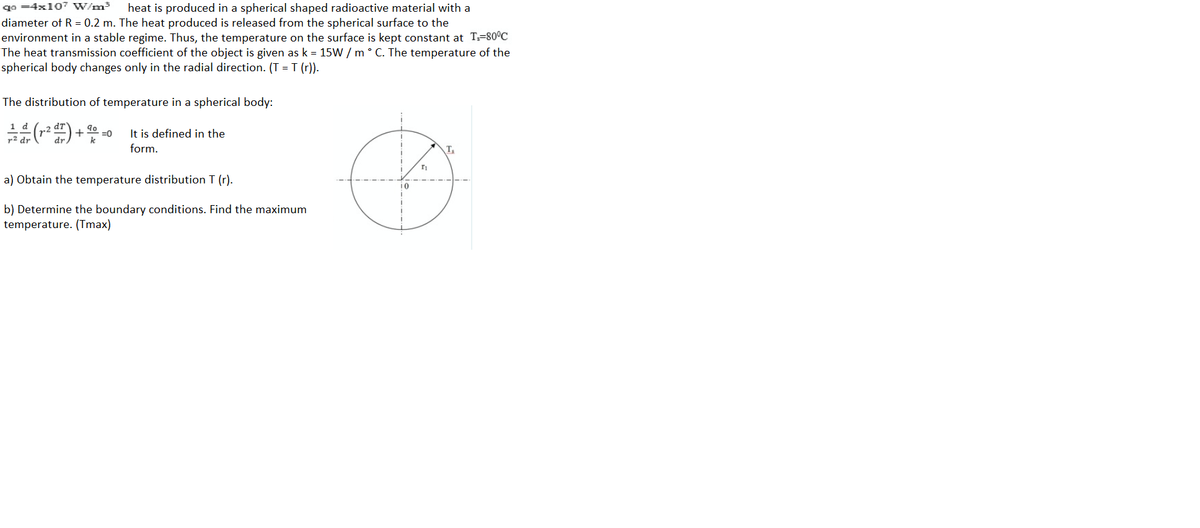eat is produced in a spherical shaped naterial with a diameter of R = 0.2 m. The heat produced is released from the spherical surface to the environment in a stable regime. Thus, the temperature on the surface is kept constant at T=80°C The heat transmission coefficient of the object is given as k = 15W / m C. The temperature of the spherical body changes only in the radial direction. (T= T (r)). The distribution of temperature in a spherical body: (r2 ) + 0 It is defined in the pa dr form. T. a) Obtain the temperature distribution T (r). b) Determine the boundary conditions. Find the maximum temperature. (Tmax)
eat is produced in a spherical shaped naterial with a diameter of R = 0.2 m. The heat produced is released from the spherical surface to the environment in a stable regime. Thus, the temperature on the surface is kept constant at T=80°C The heat transmission coefficient of the object is given as k = 15W / m C. The temperature of the spherical body changes only in the radial direction. (T= T (r)). The distribution of temperature in a spherical body: (r2 ) + 0 It is defined in the pa dr form. T. a) Obtain the temperature distribution T (r). b) Determine the boundary conditions. Find the maximum temperature. (Tmax)
Principles of Heat Transfer (Activate Learning with these NEW titles from Engineering!)
8th Edition
ISBN:9781305387102
Author:Kreith, Frank; Manglik, Raj M.
Publisher:Kreith, Frank; Manglik, Raj M.
Chapter7: Forced Convection Inside Tubes And Ducts
Section: Chapter Questions
Problem 7.4P
Related questions
Question
Hint: You found out where is the maximum temperature.

Transcribed Image Text:qo =4x107 W/m3
heat is produced in a spherical shaped radioactive material with a
diameter of R = 0.2 m. The heat produced is released from the spherical surface to the
environment in a stable regime. Thus, the temperature on the surface is kept constant at T=80°C
The heat transmission coefficient of the object is given as k = 15W / m ° C. The temperature of the
spherical body changes only in the radial direction. (T = T (r)).
The distribution of temperature in a spherical body:
=0
It is defined in the
form.
T,
a) Obtain the temperature distribution T (r).
b) Determine the boundary conditions. Find the maximum
temperature. (Tmax)
Expert Solution
This question has been solved!
Explore an expertly crafted, step-by-step solution for a thorough understanding of key concepts.
Step by step
Solved in 3 steps

Knowledge Booster
Learn more about
Need a deep-dive on the concept behind this application? Look no further. Learn more about this topic, mechanical-engineering and related others by exploring similar questions and additional content below.Recommended textbooks for you

Principles of Heat Transfer (Activate Learning wi…
Mechanical Engineering
ISBN:
9781305387102
Author:
Kreith, Frank; Manglik, Raj M.
Publisher:
Cengage Learning

Principles of Heat Transfer (Activate Learning wi…
Mechanical Engineering
ISBN:
9781305387102
Author:
Kreith, Frank; Manglik, Raj M.
Publisher:
Cengage Learning